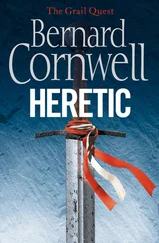Robbie Douglas, Sir William’s nephew, wore mail and a sallet, and carried a sword and shield. It had been Robbie who had brought Sir William the news that Jamie Douglas, Robbie’s older brother, had been killed, presumably by the Dominican priest’s servant. Or perhaps Father de Taillebourg had done the killing? Certainly he must have ordered it. Robbie Douglas, twenty years old, had wept for his brother. ‘How could a priest do it?’ Robbie had demanded of his uncle.
‘You have a strange idea of priests, Robbie,’ Sir William had said. ‘Most priests are weak men given God’s authority and that makes them dangerous. I thank God no Douglas has ever put on a priest’s robe. We’re all too honest.’
‘When this day’s done, uncle,’ Robbie Douglas said, ‘you’ll let me go after that priest.’
Sir William smiled. He might not be an overtly religious man, but he did hold one creed sacred and that was that any family member’s murder must be avenged and Robbie, he reckoned, would do vengeance well. He was a good young man, hard and handsome, tall and straightforward, and Sir William was proud of his youngest sister’s son. ‘We’ll talk at day’s end,’ Sir William promised him, ‘but till then, Robbie, stay close to me.’
‘I will, uncle.’
‘We’ll kill a good few Englishmen, God willing,’ Sir William said, then led his nephew to meet the King and to receive the blessing of the royal chaplains.
Sir William, like most of the Scottish knights and chieftains, was in mail, but the King wore French-made plate, a thing so rare north of the border that men from the wild tribes came to stare at this sun-reflecting creature made of moving metal. The young King seemed just as impressed for he took off his surcoat and walked up and down admiring himself and being admired as his lords came for a blessing and to offer advice. The Earl of Moray, whom Sir William believed was a fool, wanted to fight on horseback and the King was tempted to agree. His father, the great Robert the Bruce, had beaten the English at the Bannockburn on horseback, and not just beaten them, but humiliated them. The flower of Scotland had ridden down the nobility of England and David, King now of his father’s country, wanted to do the same. He wanted blood beneath his hooves and glory attached to his name; he wanted his reputation to spread through Christendom and so he turned and gazed longingly at his red and yellow painted lance propped against the bough of an elm.
Sir William Douglas saw where the King was looking. ‘Archers,’ he said laconically.
‘There were archers at the Bannockburn,’ the Earl of Moray insisted.
‘Aye, and the fools didn’t know how to use them,’ Sir William said, ‘but you can’t depend on the English being fools for ever.’
‘And how many archers can they have?’ the Earl asked. ‘There are said to be thousands of bowmen in France, hundreds more in Brittany and as many again in Gascony, so how many can they have here?’
‘They have enough,’ Sir William growled curtly, not bothering to hide the contempt he felt for John Randolph, third Earl of Moray. The Earl was just as experienced in war as Sir William, but he had spent too long as a prisoner of the English and the consequent hatred made him impetuous.
The King, young and inexperienced, wanted to side with the Earl whose friend he was, but he saw that his other lords were agreeing with Sir William who, though he held no great title nor position of state, was more battle-hardened than any man in Scotland. The Earl of Moray sensed that he was losing the argument and he urged haste. ‘Charge now, sir,’ he suggested, ‘before they can make a battleline.’ He pointed southwards to where the first English troops were appearing in the pastures. ‘Cut the bastards down before they’re ready.’
‘That,’ the Earl of Menteith put in quietly, ‘was the advice given to Philip of Valois in Picardy. It didn’t serve there and it won’t serve here.’
‘Besides which,’ Sir William Douglas remarked caustically, ‘we have to contend with stone walls.’ He pointed to the walls which bounded the pastures where the English were beginning to form their line. ‘Maybe Moray can tell us how armoured knights get past stone walls?’ he suggested.
The Earl of Moray bridled. ‘You take me for a fool, Douglas?’
‘I take you as you show yourself, John Randolph,’ Sir William answered.
‘Gentlemen!’ the King snapped. He had not noticed the stone walls when he formed his battleline beside the burning cottages and the fallen cross. He had only seen the empty green pastures and the wide road and his even wider dream of glory. Now he watched the enemy straggle from the far trees. There were plenty of archers coming, and he had heard how those bowmen could fill the sky with their arrows and how their steel arrow heads drove deep into horses and how the horses then went mad with pain. And he dared not lose this battle. He had promised his nobles that they would celebrate the feast of Christmas in the hall of the English King in London and if he lost then he would lose their respect and encourage some to rebellion. He had to win and, being impatient, he wanted to win quickly. ‘If we charge fast enough,’ he suggested tentatively, ‘before they all reach their lines—’
‘Then, you’ll break your horse’s legs on the stone walls,’ Sir William said with scant respect for his royal master. ‘If your majesty’s horse even gets that far. You can’t protect a horse from arrows, sir, but you can weather the storm on foot. Put your pikes up front, but mix them with men-at-arms who can use their shields to protect the pike-holders. Shields up, heads down and hold hard, that’s how we win this.’
The King tugged at the espalier which covered his right shoulder and had an annoying habit of riding up on the top edge of the breastplate. Traditionally the defence of Scottish armies was in the hands of pikemen who used their monstrously long weapons to hold off the enemy knights, but pikemen needed both hands to hold their unwieldy blades and so became easy targets for English bowmen who liked to boast that they carried the lives of Scottish pikemen in their arrow bags. So protect the pikemen with the shields of the men-at-arms and let the enemy waste their arrows. It made sense, but it still irked David Bruce that he could not lead his horsemen in an earth-shaking assault while the trumpets screamed at the heavens.
Sir William saw his King’s hesitation and pressed his argument. ‘We have to stand, sir, and we have to wait, and we have to let our shields take the arrows, but in the end, sir, they’ll tire of wasting shafts and they’ll come to the attack and that’s when we’ll chop them down like dogs.’
A growl of assent greeted this. The Scottish lords, hard men all, armed and armoured, bearded and grim, were confident that they could win this fight because they so outnumbered the enemy, but they also knew there was no short cut to victory, not when archers opposed them, and so they would have to do what Sir William said: endure the arrows, goad the enemy, then give them slaughter.
The King heard his lords agree with Sir William and so, reluctantly, he abandoned his dream of breaking the enemy with mounted knights. That was a disappointment, but he looked about his lords and thought that with such men beside him he could not possibly lose. ‘We shall fight on foot,’ he decreed, ‘and chop them down like dogs. We shall slaughter them like whipped puppies!’ And afterwards, he thought, when the survivors were fleeing southwards, the Scottish cavalry could finish the slaughter.
But for now it would be footman against footman and so the war banners of Scotland were carried forward and planted across the ridge. The burning cottages were mere embers now that cradled three shrunken bodies, black and small as children, and the King planted his flags close to those dead. He had his own standard, red saltire on yellow field, and the banner of Scotland’s saint, white saltire on blue, in the line’s centre and to left and right the flags of the lesser lords flew. The lion of Stewart brandished its blade, the Randolph falcon spread its wings while to east and west the stars and axes and crosses snapped in the wind. The army was arrayed in three divisions, called sheltrons, and the three sheltrons were so large that the men on the far flanks jostled in towards the centre to keep themselves on the flatter ground of the ridge’s summit.
Читать дальше












